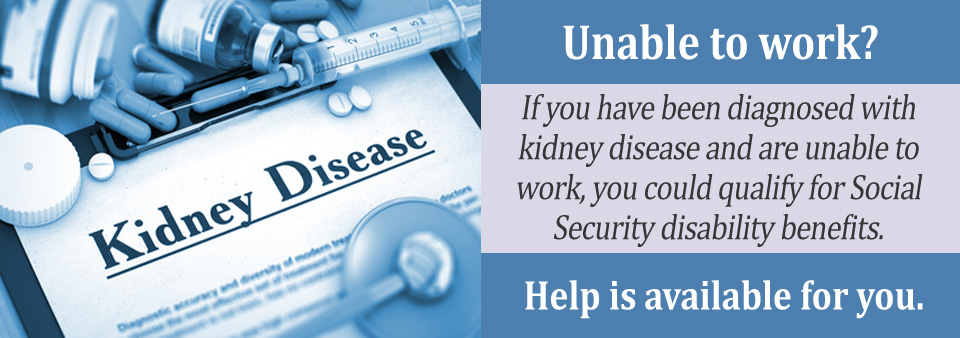If you cannot work and earn a living because of kidney disease, and your condition prevents you from earning a living for a minimum of 12 months, you may qualify for disability benefits from the Social Security Administration (SSA). The following five signs that you will be approved for disability with kidney disease:
Sign 1: You meet requirements that are non-medical
You have earned enough credits to be covered by Social Security Disability Insurance (SSDI) and have paid enough taxes. Usually, you must have worked five years full-time out of the last 10 years, but that could vary. Call the SSA to see if you are covered.
Sign 2: You have compiled strong medical evidence
Often, kidney disease disability claims are denied simply because there is a lack of supporting medical evidence and documentation. You are more likely to be awarded disability benefits if you have details about how you are affected by the kidney disease, you discuss your treatment options and your response to those treatments, and you have supporting medical documentation that confirms the severity of the kidney disease.
Sign 3: Your condition prevents you from working for 12 months
You have a chance of getting your disability claim approved if you are unable to work for at least a year because of kidney disease. In order to qualify for Social Security disability, you have to be out of work for at least one year because of the medical condition.
Sign 4: You meet the criteria listed in the Blue Book
The Blue Book is the SSA’s medical guide that determines whether an individual meets the criteria to qualify for disability benefits. To qualify for disability with kidney disease, you must require ongoing dialysis, ongoing hemodialysis, kidney transplantation, or have reduced glomerular filtration. To qualify for reduced glomerular filtration, you must show that you have renal bone degradation and bone pain, peripheral neuropathy, or fluid overload syndrome despite taking medications to treat the problem. If you cannot meet the listing criteria, you can still qualify using a medical vocational allowance, which takes your medical condition, age, work history, transferrable skills, and educational background into consideration. Your physician will need to complete a residual functional capacity (RFC) form that details your condition and restrictions.

Sign 5: You have consulted with a Social Security disability lawyer
Attorney will provide you with legal representation. They can determine what evidence strongly supports your claim. Your attorney will use your medical records and determine what additional evidence your claim will need to be successful. Your lawyer knows all the proper testing for your kidney condition that you should undergo. Also, they know that you have all the supporting evidence that the disability examiner will need to approve your disability claim because of the severity of your condition. If you are ready to apply for disability benefits for kidney disease, get a free case evaluation from a disability lawyer today.
Additional Resources
- This is How to Qualify for Disability with Kidney Disease
- How Disabling is Kidney Disease?
- Benefits Of Applying For SSDI While on Kidney Dialysis
- Permanent Restrictions After Developing Kidney Disease